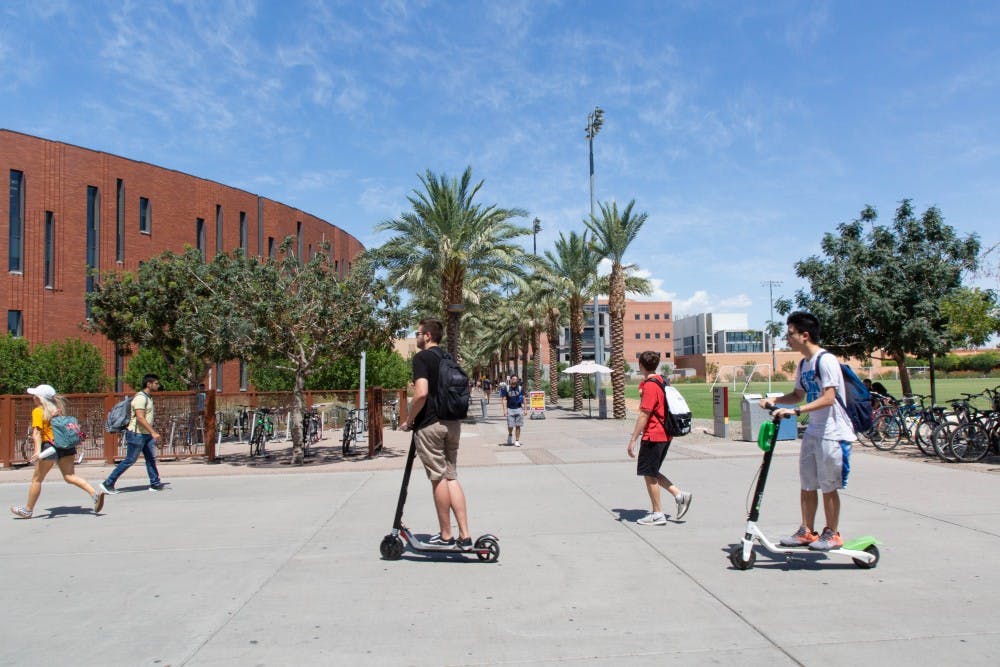Dockless scooters may seem like a convenience for students to travel around campus efficiently and at a reasonable price point, but Tempe citizens worry they can be a dangerous nuisance on public sidewalks.
During the summer, two dockless scooter companies, Bird and Lime, unveiled their app-based dockless motorized scooter rentals in Tempe, leaving around 400 scooters in the area, according to Brianne Fisher, a mayoral aide for the city of Tempe.
Both companies offer electric scooters that users can pay to rent from their phones. Riders must be at least 18 and provide a photo of their drivers license to use the the app, which charges users by the minute after an initial fee.
Many users ride the scooters on sidewalks at speeds of up to 15 miles per hour. However, riders are supposed to use the scooters in the bike lane and wear a helmet, according to the Bird website.
Fisher led a public meeting concerning the first draft of a licensing agreement between the city of Tempe and any current or future rental transportation companies Tuesday night.
The scooters can be left anywhere – residents at Tuesday's meeting were prompted to cite incidents of people leaving them in the road or even in residents' front yards.
With no licensing agreement in place to regulate how the scooters are operated, Fisher said it is hard to hold companies accountable when their scooters are left in places that can be a nuisance for the public or when users ride them unsafely on the sidewalks.
The agreement is projected to be in place by the end of the year, Fisher said, and includes five main goals to help solve the community's worries. These goals include increased safety, parking regulations and access to company data, she said.
Tempe has dealt with dockless transportation in the past. Ofo, a yellow bike sharing company took to the streets in December 2018. Ofo has since pulled its bikes from the city. Fisher said Ofo left on its own, and the company was not pressured by the city of Tempe to leave.
Freda Rothermel, a travel expert who lives in Tempe, said she believes the scooters are a problem because riders do not follow the policies instructing users to wear a helmet and not to ride on the sidewalk.
“People come up from behind me on the sidewalk saying, 'get out of the way! Get out of the way!'” she said. “I’m walking my dog and I have to walk into the street. People are out of control.”
Rothermel also said she has seen the Bird scooters in California, and she believes they have been a problem there as well.
“Lifeguards have to spend their time looking for scooters on the boardwalk instead of looking out at the water,” she said. “I believe the city of Tempe should make Bird-free zones.”
Andrew Shear, a business communications sophomore, said he uses Bird scooters frequently and believes they should stay in Tempe.
“When I have to go all the way across campus, I use a Bird,” he said. “It’s an inexpensive and efficient way to get around.”
However, Shear also said he believes there should be more enforced rules on where people can leave them.
“I always try to leave mine next to a wall and away from where people walk,” he said. “It should be obvious to be considerate towards other pedestrians.”
Chad Campbell, the senior vice president at Strategies 360 in Arizona, a consulting firm, said he and his team represents Bird in Arizona.
Campbell said he believes that Bird's program is safe, but some people will always break the rules and not listen to the app's instructions. The company is trying to address this problem, he said.
Campbell also said the company is interested in the city of Tempe’s agreement and is excited to work with them.
Fisher said she hopes to see the licensing agreement improve the safety of the scooters in Tempe because she thinks they can be an asset for the city, adding that she wants transportation to be “safe and accessible for all."
Reach the reporter at ajhowar6@asu.edu and follow @andrew_howard4 on Twitter.
Like The State Press on Facebook and follow @statepress on Twitter.




